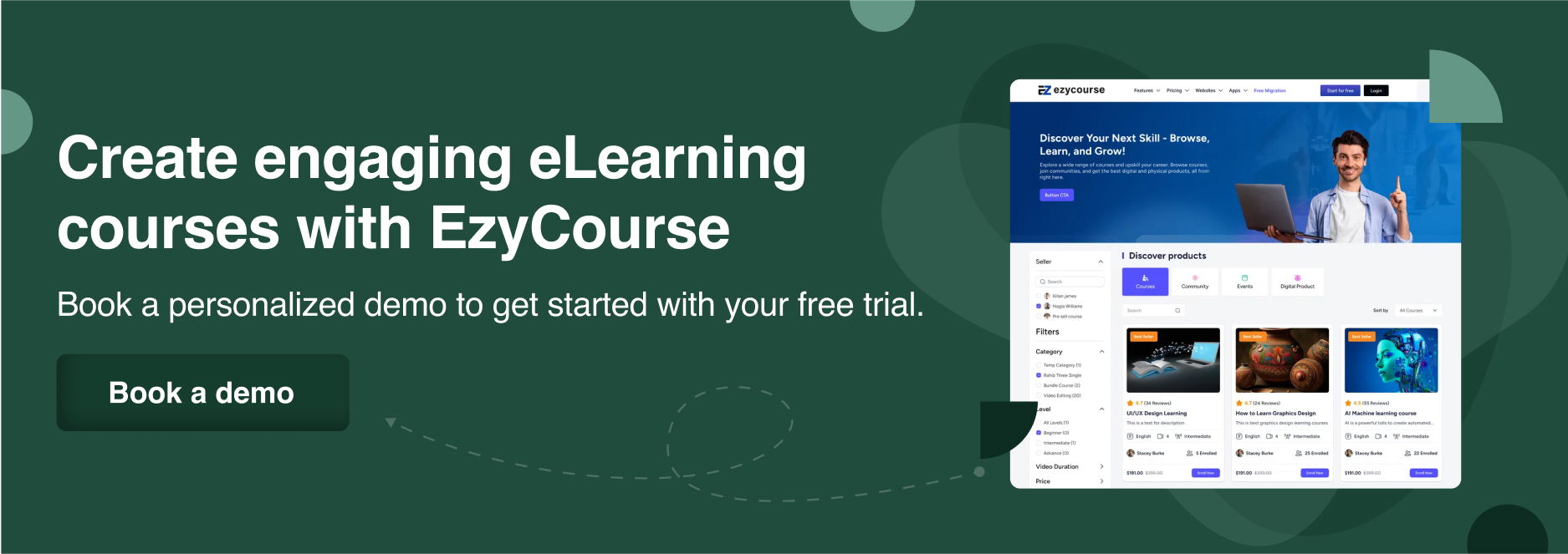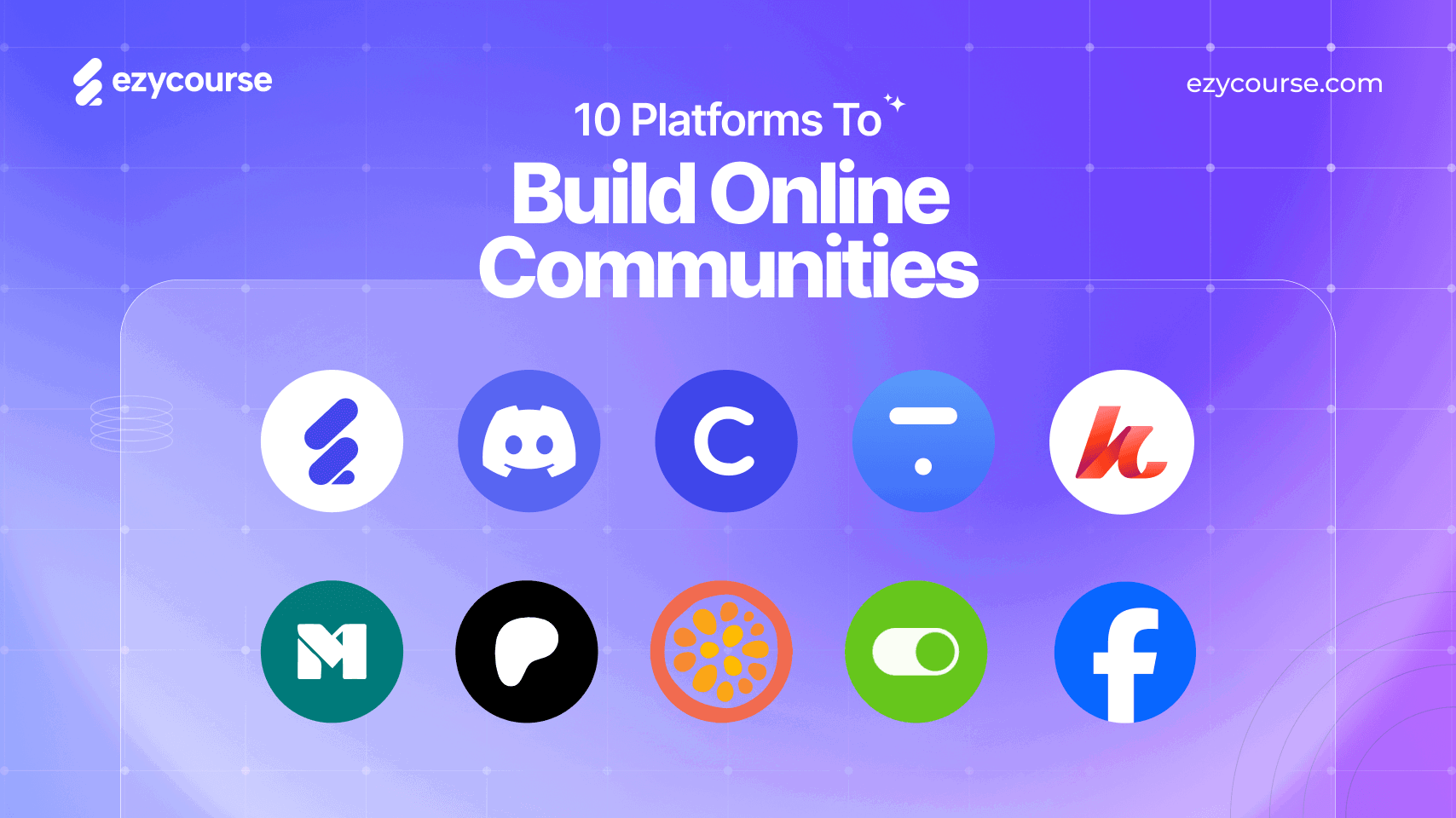Trying to keep your audience engaged? It’s not easy.
Whether you’re running an online business, a course, or a membership site, you know that just posting content isn’t enough anymore. People want connection. They want a space to ask questions, engage in meaningful conversations, share experiences, and feel like they belong.
That’s where online communities shine.
The global enterprise social networks and online communities market is estimated to be valued at $5,539 Million with a CAGR of 16.5% during the forecast period 2021-2028.
A strong online community helps you build trust, boost retention, and turn casual visitors into loyal customers. But how can you build an online community for your business?
In this blog, we’ll walk you through the 10 platforms to build an online community in 2026. At the same time, we’ll also guide you on how to choose the best platform to build online community.
Let’s begin.
10 Best Platforms to Build an Online Community
Here are the 10 best platforms to build your online community:
EzyCourse
Thinkific
Mighty Networks
Circle
Discord
Patreon
Facebook Groups
Kajabi
Bettermode
Disciple
Alright, let's jump into the details of these platforms.
1. EzyCourse
EzyCourse is the best platform to build online community in 2026. It is an all-in-one platform for content creators, businesses, educators, and enterprises to build, grow, and monetize online businesses to enjoy financial freedom.
Using EzyCourse, you can easily generate and sell online courses and digital products, services, and memberships, as well as build vibrant online communities around your brand.
EzyCourse has all the crucial tools you need to develop a strong online presence, from customizable courses to membership sites & community engagement features.
You can easily design and launch an online community platform without any technical knowledge, thanks to its user-friendly interface. Design customizations are also a walk in the park.
You can watch this video to understand how dynamic the EzyCourse community feature is and how easy it is to build an online community with it.
EzyCourse offers a mobile app for effortless online community management. You can interact with your customers no matter where you are.
With EzyCourse, you can create discussion boards, live chat, and private groups to engage with your audience. It is easy to keep hold of your members and send personalized content with its built-in email marketing tools.
Moreover, you can automate emails. All of these are essential for building a loyal and engaged community.
Key Features
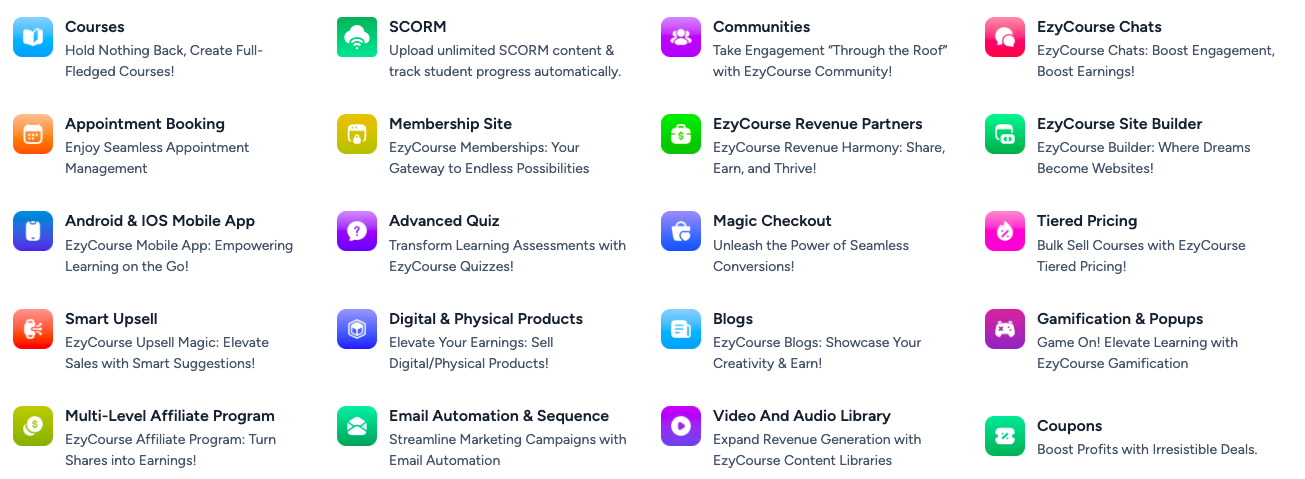
Community Building Features: EzyCourse allows your community members to interact with each other through discussion boards, messaging, and other activities. These help to boost community engagement and keep the customers active.
Membership: With EzyCourse, you can easily create a membership site that come with unique access features. This allows you to offer your community members extra stuff, something that is not available to the general audience, you can easily do that.
Course Creation Tools: EzyCourse has a complete solution for creating and delivering online courses. You can upload videos, documents, quizzes, assignments, and more for your community members’ learning experience.
Integrated Payments: The platform supports integrated payment options, allowing you to earn money by selling courses, getting subscriptions, or charging for events.
Customization & Branding: You are able to modify the community platform to align it with your business or personal brand, as EzyCourse provides customization options.
Live Sessions & Webinars: With this platform, hosting live sessions, webinars, and interactive events is nearly effortless. You can start a Q&A chat, workshop, or group discussion- each approach often brings community members together immediately with a real-time connection.
Automated Marketing & Engagement: EzyCourse packs built-in marketing features like email sequences, notifications, and promo campaigns. These handy tools help your community grow and stay active while saving you from drowning in tedious manual work.
Analysis & Reporting: EzyCourse offers information on how your community engages and grows, including an evaluation of its performance.
Gamification: EzyCourse amplifies member involvement through badges, leaderboards, and even achievements.
Integration with Other Tools: EzyCourse works perfectly with well-known services such as Zoom, Google Analytics, marketing tools, etc.
Pros
Simple course creation and community engagement.
Seamless integration with various platforms.
Strong member management tools.
Easy creation and selling of online courses.
Interactive features like live sessions and forums.
Full customization options for branding.
Detailed analytics to understand community needs.
Effortless scalability to support growth.
Built-in marketing tools for course promotion.
Responsive customer support and helpful resources.
Cons
Steeper learning curve for beginners.
Integration options may be less extensive.
Pricing

Pricing is subject to change anytime
EzyCourse offers four pricing plans.
1. Essential: $59/month (billed annually)
2. Pro: $139/month (billed annually)
3. Unlimited: $199/month (billed annually)
4. Elite: $299/month (billed annually)

2. Thinkific
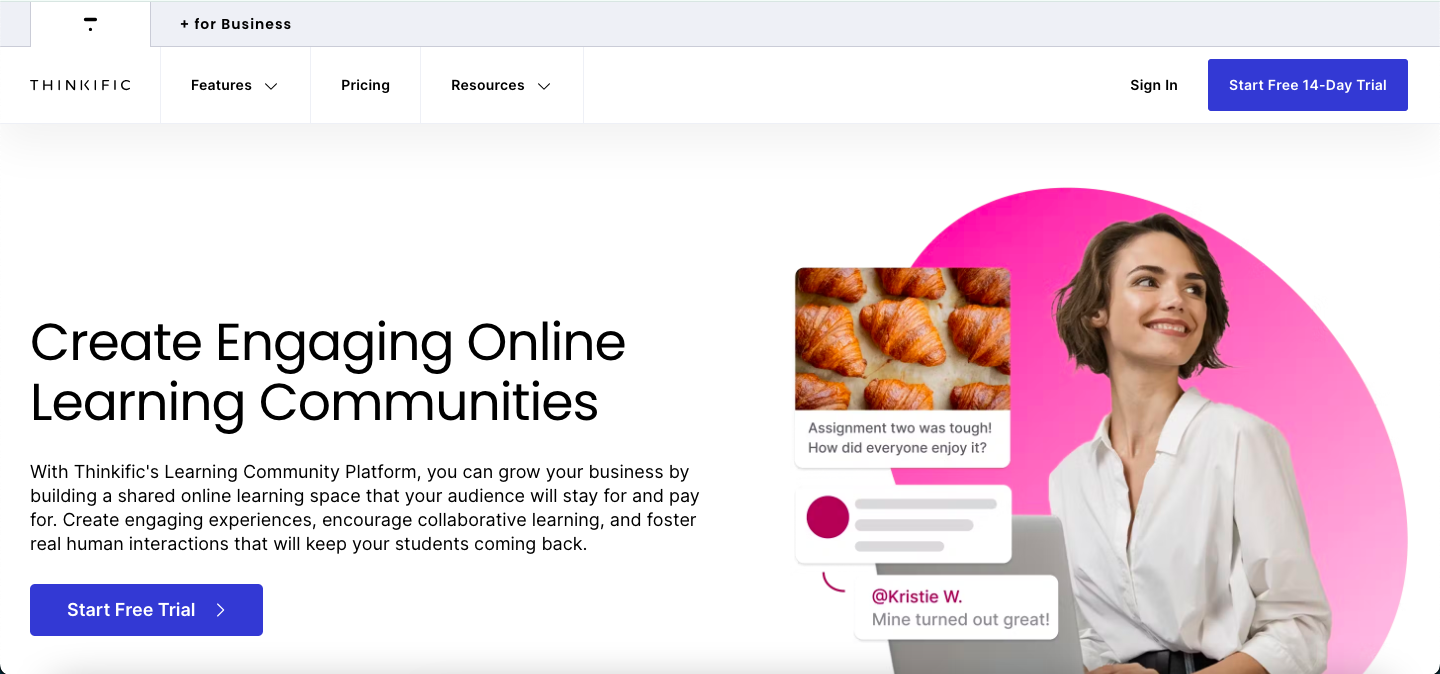
Thinkific is an online course platform that streamlines the course creation and delivery process. The platform offers a simple yet intuitive tool for creating enrollment-based courses or a community that stands alone as a product or complement to a product.
Thinkific offers an easy-to-use Community Builder, and you can sell the community to your customers as part of a bundle or a subscription as a membership.
Key Features
Drag-and-drop builder: The user-friendly interface allows for simple creation and arrangement of course materials.
Multimedia support: You can incorporate various media elements such as videos, audio tracks, PDFs, and so much more into your courses.
Interactive Community: You can create online communities for your students or customers where they can share their thoughts and interact with each other.
Methods of Accessing Learners: You have access to tools like forums and private messaging that aid student engagement and interaction.
Marketing Integrations: Thinkific allows integrations with your preferred marketing platforms for email marketing, blog publishing, social media management, and more.
Advanced analytics: Thinkific gives you deep insights to track student engagement, revenue, and other key metrics with detailed reports.
Pros
Landing page builder included for convenience.
Built-in marketing and sales tools streamline your marketing.
Integrations with popular tools.
Cloud hosting allows custom domain linking.
User-friendly interface with many customization options.
White-label feature enhances brand identity.
Cons
Limited design control for customization.
Complex course creation can be tricky.
No support for SCORM, TinCan, or AICC.
Lack of social features reduces engagement.
Sales-focused platform over learning quality.
Pricing
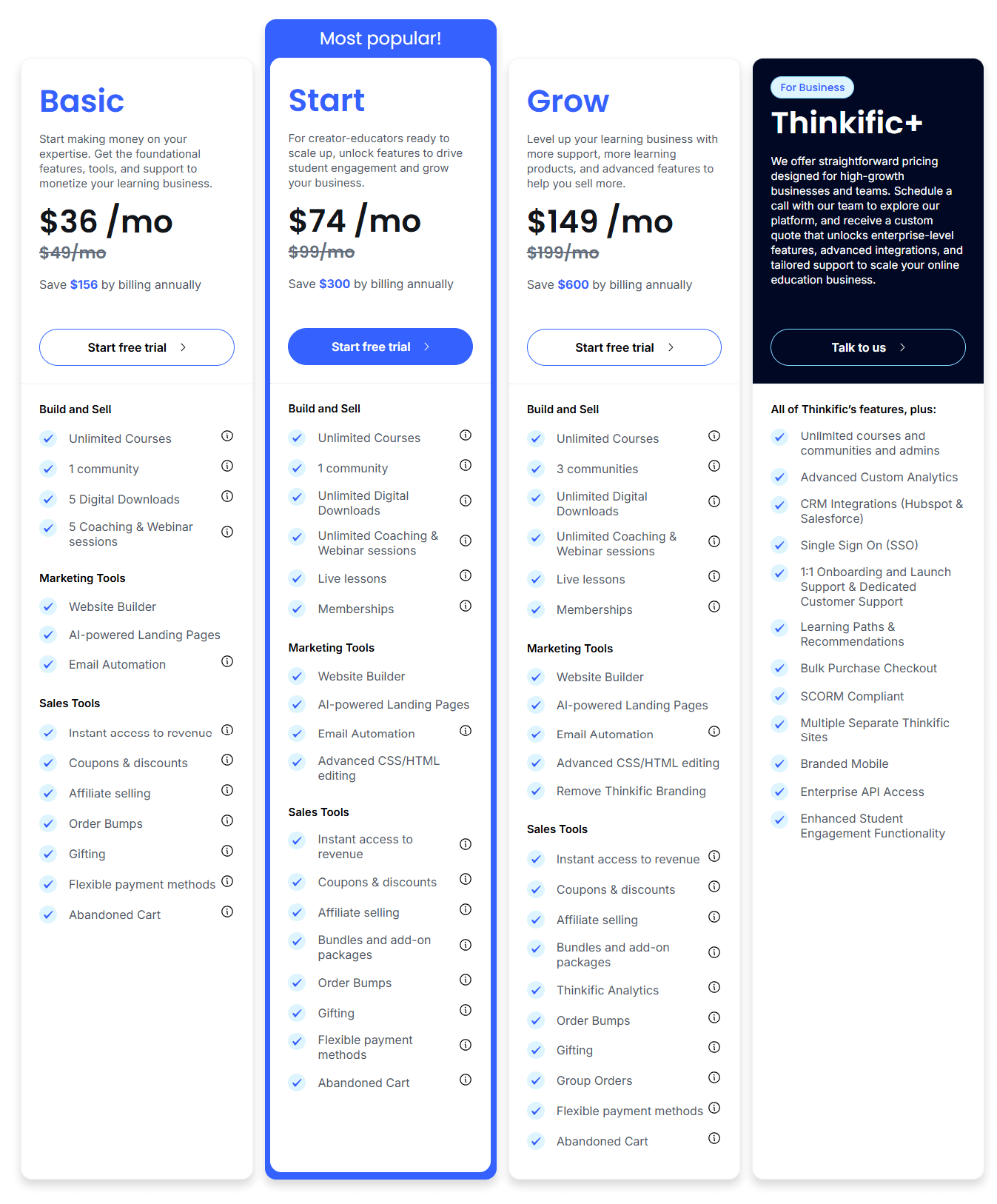
Thinkific offers different pricing plans.
1. Basic: $36/month (billing annually)
2. Start: $74/month (billing annually)
3. Grow: $149/month (billing annually)
3. Mighty Networks
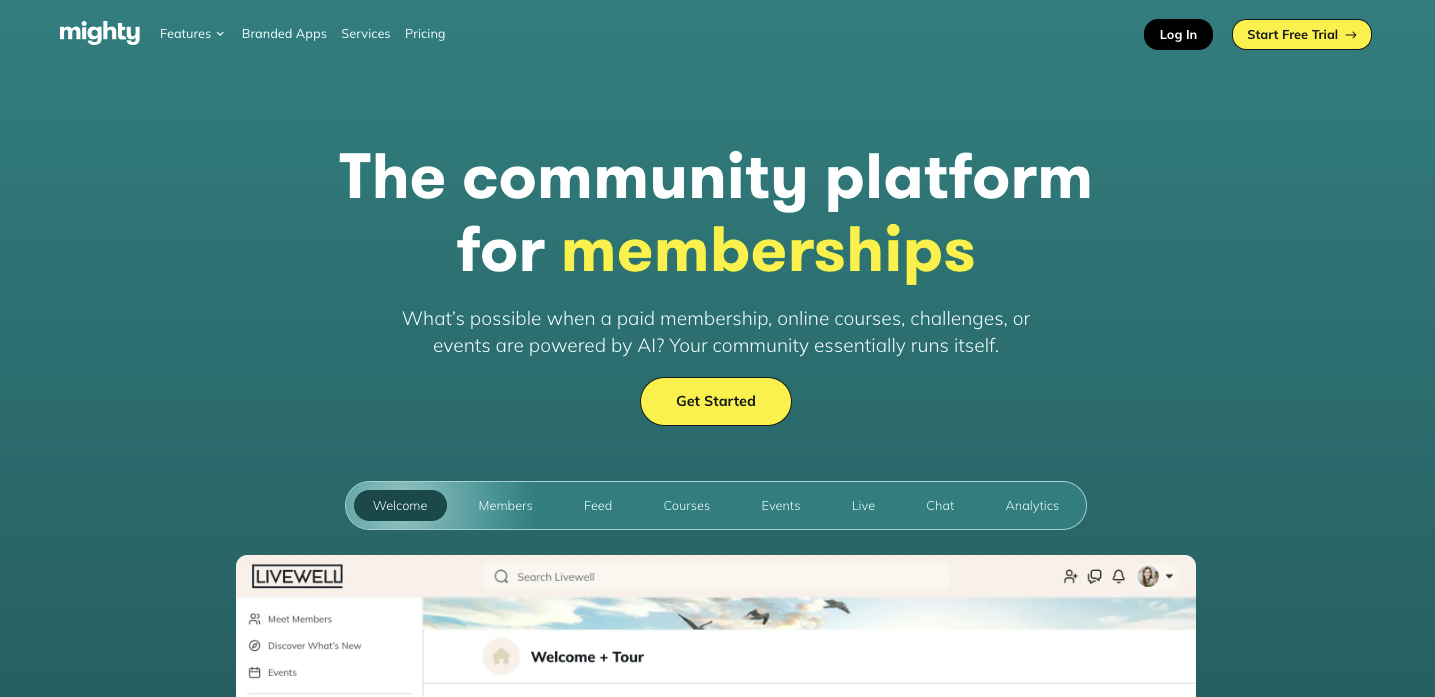
Mighty Networks is a powerful community-building and course-creation platform. It provides a way for creators to unite their audience in one place that they can brand, and which enables interactions and engagement.
Mighty Networks empowers you to create a comprehensive and integrated online ecosystem with its advanced offerings for community, courses, and memberships.
Focused on a mission that revolves around building the community, this platform provides discussion forums, member networking, and customizable content channels.
You can be a part of the Mighty Networks community as an expert by hosting virtual events, selling your courses or membership, and providing a more consolidated experience for your users.
Key Features
Community Building: Mighty Networks provides tools for creating and managing diverse online communities, fostering engagement between members and the host.
Content Delivery: You can create and share various content formats, including articles, videos, and live streams, to engage your audience.
Monetization: Mighty Networks offers various options for monetizing your communities, including membership subscriptions, course sales, and event tickets.
Customization: You can customize your communities with branded themes, colors, and custom domains to reflect your brand identity.
Engagement Tools: Features like polls, events, live streaming, and direct messaging enhance member interaction and community engagement.
Analytics & Insights: Mighty Insights provides data and analytics to track community growth, member engagement, and other key metrics.
Integration: Mighty Networks integrates with other platforms like Zapier, allowing you to connect your community with other tools and services.
Pros
Advanced community management features.
Personalized, customizable activity feed.
AI-powered community builder tool.
Drip-feed content delivery supported.
Separate pricing for courses and community.
Native video uploading is supported.
Native mobile app available (with extra cost).
Cons
No external course selling is allowed outside the community.
Limited options for customization, pricing, and payments.
Basic controls for course management.
Pricing

Mighty Networks pricing plans are as follows:
1. The Community Plan: $41/month (billed annually)
2. The Courses Plan: $99/month (billed annually)
3. The Business Plan: $179/month (billed annually)
4. The Path-to-Pro Plan: $360/month (billed annually)
4. Circle
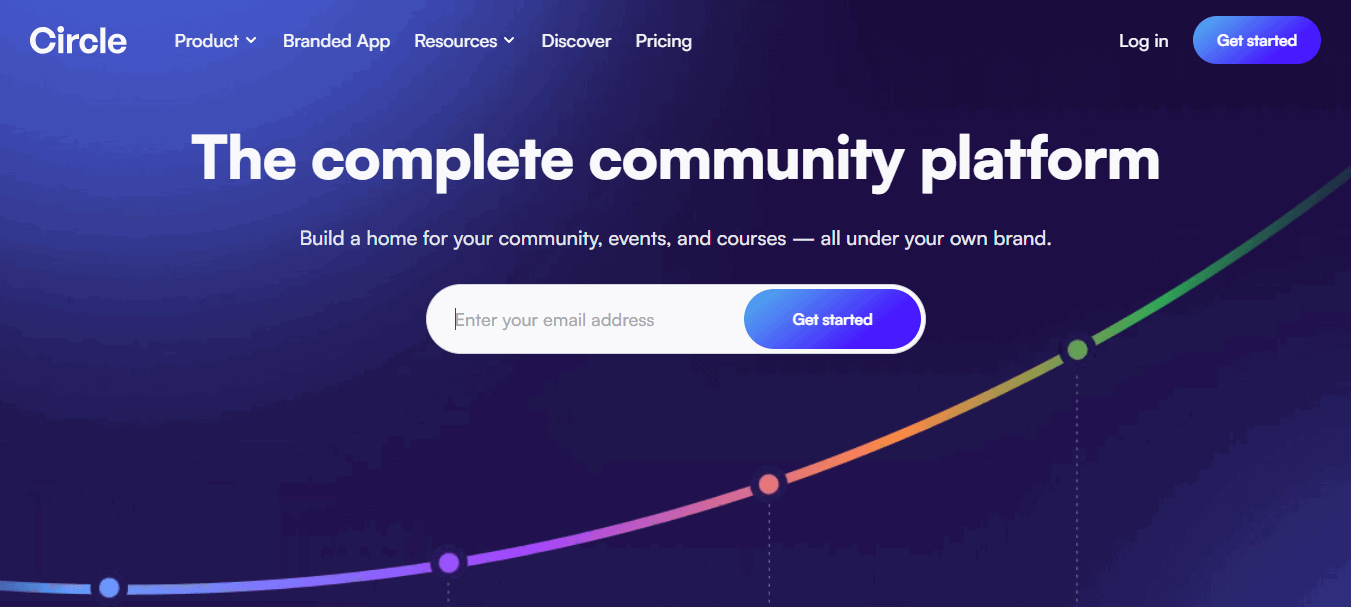
Circle community platform emphasizes on creating a meaningful connection since it offers a workspace for discussing, sharing content, and collaborating. Inside the platform, you can build a branded community hub tailored to their audience.
Circle empowers open and private communities, allowing them to manage access and privacy. Circle takes a big step in simplifying community building with features such as discussions, events, and integrations on a single, easy-to-use platform.
Related read: Best Circle Community Alternatives
Key Features
Customizable Spaces: Circle allows you to create different "spaces" within your community, acting as channels or forums for specific topics or groups.
Events Integration: You can easily create and manage events, including scheduling, reminders, and time zone adjustments.
Integrated Courses: Circle allows users to build and host online courses within their community, including basic course creation tools.
Native Paywall: Circle includes a built-in paywall to monetize your content and community access.
Mobile App: Circle offers a mobile app for iOS and Android, making it easier for your community members to participate on the go.
Pros
Simple setup with a user-friendly interface.
Excellent customer support is available.
White-label option boosts brand control.
SSO and robust community features included.
Multiple selling and promotion options offered.
The Private Circle community is built in.
Cons
No learning analytics are provided.
Limited presets and design flexibility.
Restrictive pricing hides some important key features.
No white-label for mobile applications.
Only basic learning content is supported.
Pricing
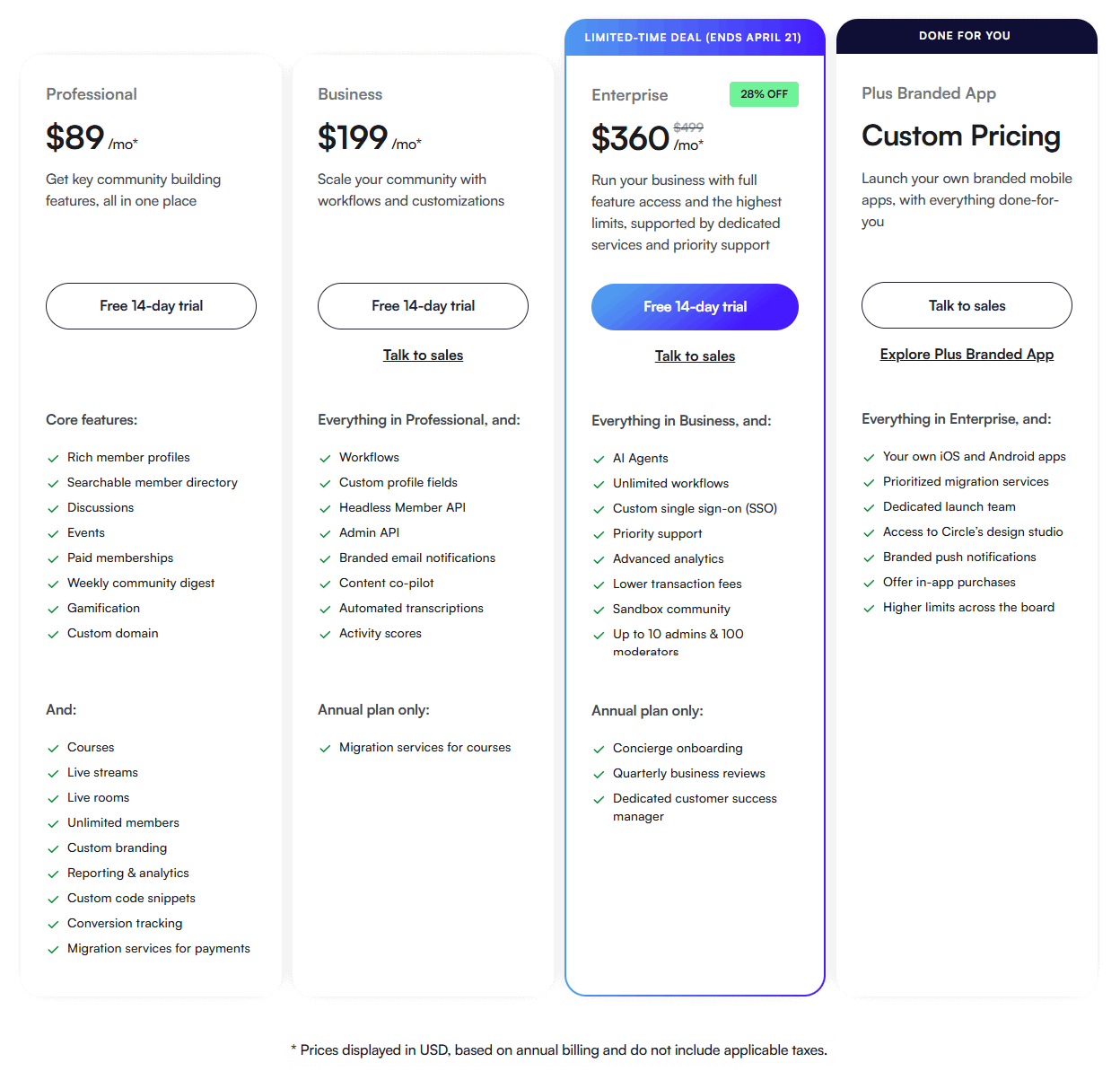
Circle offers four pricing plans.
1. Professional: $89/month (billed annually)
2. Business: $199/month (billed annually)
3. Enterprise: $360/month (billed annually)
4. Plus Branded App: Custom Pricing

5. Discord
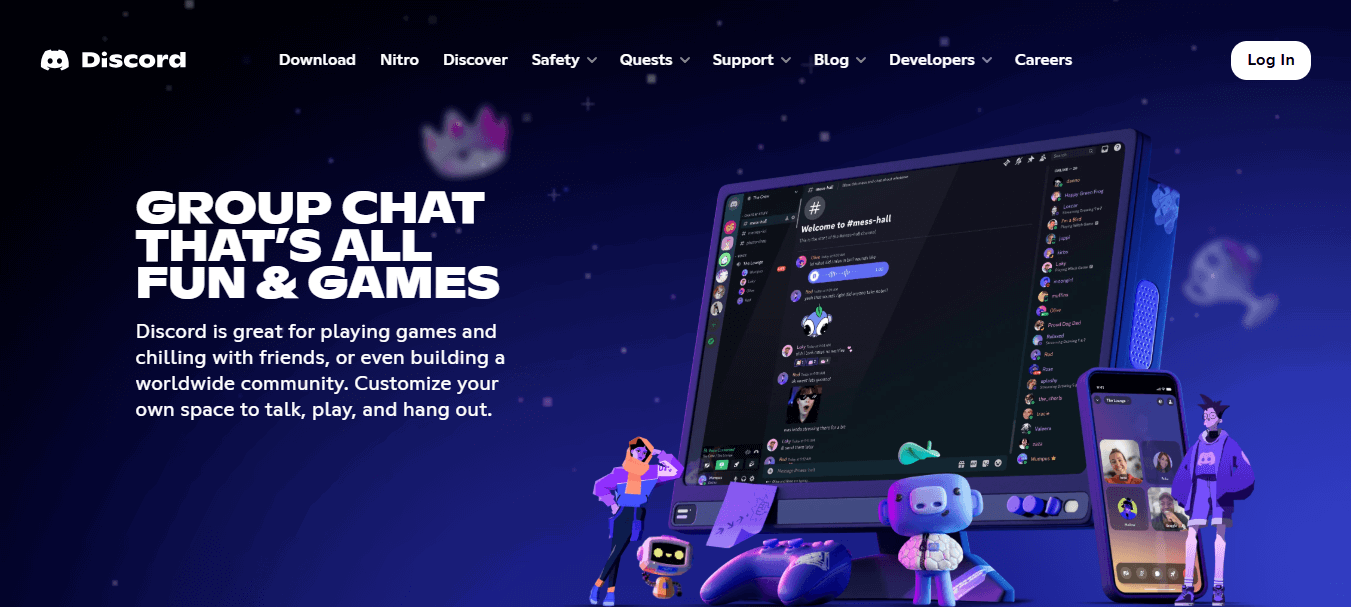
Discord is a well-known communication tool, initially created for gamers, that has now become a multipurpose app for building communities based on different interests. It offers text, voice, and video communications in servers and channels that can be tailored to individual needs.
The strongest point behind Discord is real-time interactive communication that enables Discord to be great for building relatable communities across the spectrum, whether gaming, hobbies, or work.
Discord provides a lively space for developing and managing communities, with features such as roles, permissions, and integrations with other applications.
You can create a Discord community and leverage the strength of Discord for community engagement, brand advertising, and marketing.
Key Features
Voice and Video Calls: Discord allows you to have real-time voice and video conversations, both individually and in groups.
Servers: Discord servers are virtual spaces where you can gather and form communities around shared interests.
Community Features: Discord offers features specifically designed for community management, such as announcement channels, stage channels, and forum channels.
Screen Sharing: You can share your screens with others in a server or direct message, facilitating collaboration and demonstration.
Pros
Free access with no cost.
Simple interface and fast performance with great UI.
Dedicated community support.
Strong discoverability and customization options.
Useful tool for streamers.
Cons
Business features are lacking.
Limited spam control tools on public servers.
HD streaming needs an upgrade.
No file or media sorting.
Basic sales or monetization tools only.
Pricing
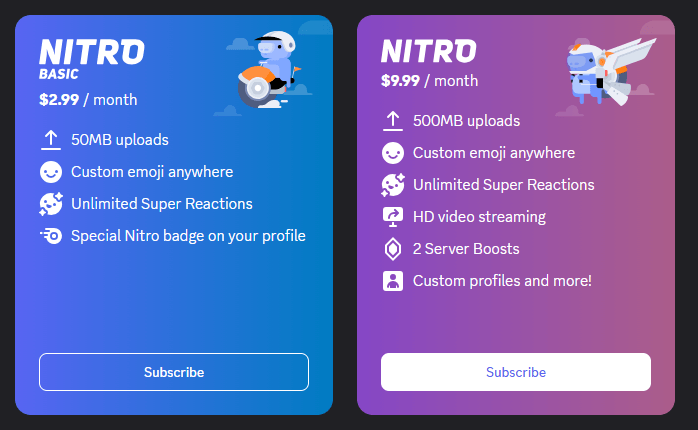
Discord primarily offers a free plan with basic communication features. It also offers two premium plans.
1. Nitro Basic: $2.99/month
2. Nitro: $9.99/month
6. Patreon

Professionals from different backgrounds can monetize their content as well as build a loyal community of patrons using Patreon. It allows content creators to earn money and create a following of fans.
Creators (musicians, artists, writers, or any other creatives) can provide behind-the-scenes content, rewards, and membership tiers to their members in return for continued support.
Although largely a crowdfunding site, Patreon creates a community around creators for them to engage with their audience. They have an exclusive feed where you can share updates, exclusive content, private messages, and community posts.
Key Features
Membership Tiers: You can create multiple levels of membership, each offering different perks and benefits. So, your patrons can choose the level of support that works best for them.
Direct Support: Patreon offers you direct support of earnings, lowering your dependency on ad revenue, sponsorships, or different monetization methods.
Communication Tools: You can engage with patrons through messaging, posts, live chats, and private communities on the platform.
Analytics: Patreon offers analytics and insights to help you track your patron engagement, income, and growth.
Integration: You can integrate Patreon with other platforms like YouTube, WordPress, Discord, and more to streamline your content distribution and access management.
Pros
Mobile app offers a simple user experience.
The live chat feature enables real-time support.
Free access makes starting quick and easy.
Video and live streaming are fully supported.
Cons
Limited course promotion and e-learning tools.
High revenue share taken from creators.
Confusing or lacking API documentation hinders integration.
No learning analytics to track progress.
Pricing
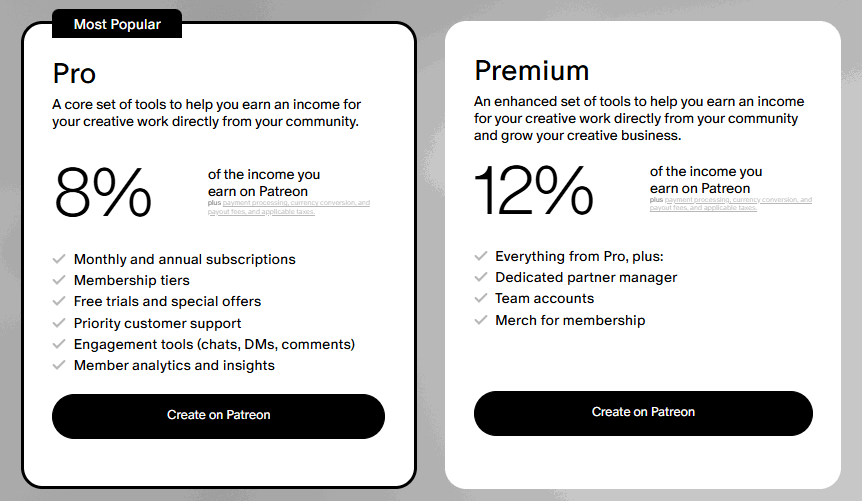
Starting a Patreon is free. Then, you have the option to choose a subscription plan to get access to some exclusive features. Patreon will charge you based on your income.
1. Pro: 8% of the income you earn on Patreon
2. Premium: 12% of the income you earn on Patreon
7. Facebook Groups
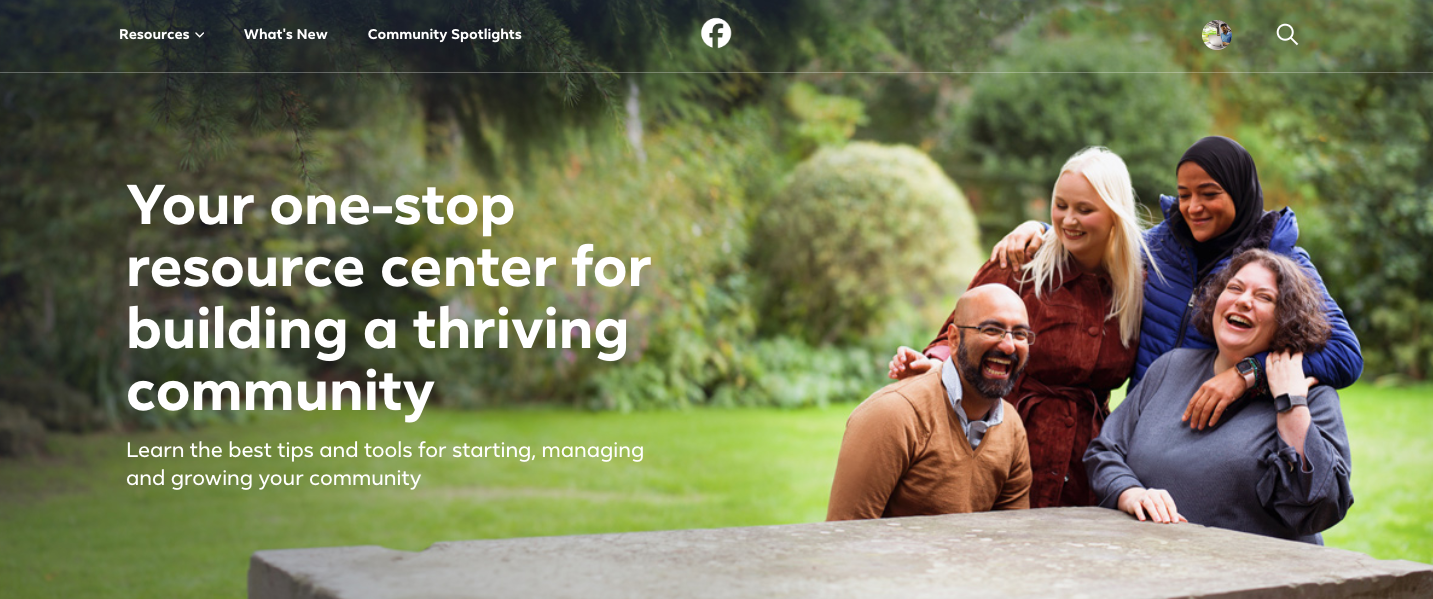
Facebook Groups are an adaptable and popular segment of the wider Facebook ecosystem, allowing users to create online communities.
Besides the interface being user-friendly, it also easily enables discussions, content sharing, and event planning while providing excellent moderation tools for communities.
Facebook Groups can be public or private and allow membership based on common interests, affiliations, or objectives. With comment threads, announcements, and multimedia content to support discussions, Groups are often suited to many types of communities.
Related read: Best Alternatives to Facebook Groups
Key Features
Community Building: Groups are designed to foster a sense of community around shared interests, allowing members to connect, share information, and engage in discussions.
Content Sharing and Engagement: You can post content, comment on posts, and participate in discussions, encouraging interaction and collaboration.
Privacy and Security: Groups can be public or private, offering flexibility in controlling who can join and access content.
Moderation and Management: Admins have tools to manage group membership, content, and settings, ensuring a positive and productive environment.
Group Chat and Messaging: You can communicate with others through group chat, fostering real-time conversations and collaboration.
Group Insights: Admins can access insights into group member activity and engagement, providing valuable data for community management.
Pros
Large user base for community growth.
A familiar interface aids in easy navigation.
Multimedia integration and a variety of content sharing are fully supported.
Facebook Events integration included.
Cons
Limited options for customization.
Privacy concerns with personal Facebook profiles.
Paid ads needed for wider reach.
Reduced content visibility results from how Facebook’s algorithm manages the organic reach of posts.
Pricing
Free to create and use.

8. Kajabi
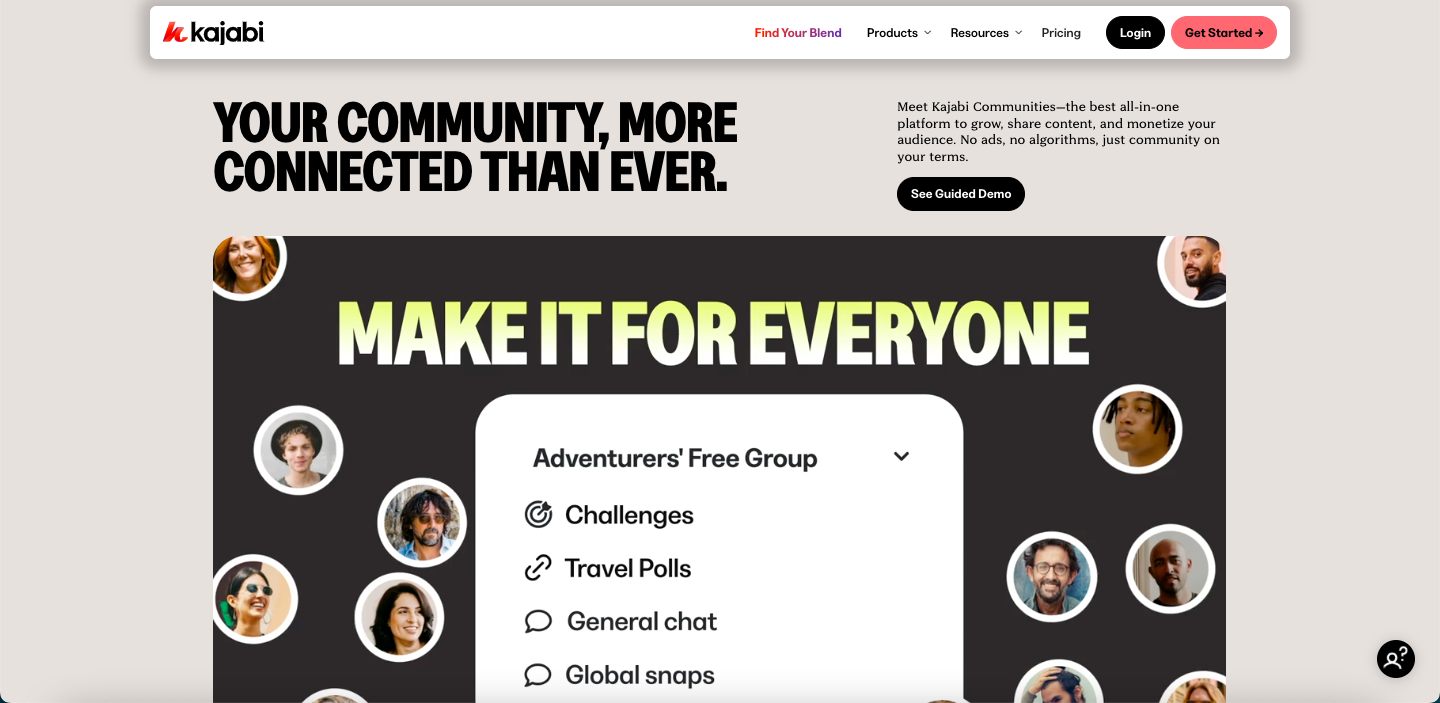
Known as an all-in-one platform, Kajabi aims to make the processes of online course creation, marketing, and sales much easier. It is a little different from other platforms as it provides an integrated suite of marketing tools that help course creators market and sell their courses.
It may not match up in terms of course creation and e-learning features, but it gives creators the ability to build sales funnels, sales pages, landing pages, webinar pages, and advertising campaigns.
Kajabi offers its Communities feature, so you can create and run your own community. The tools feature live video conferencing, newsfeed discussions, private messaging, a member directory, a smart recording archive, and a leaderboard.
Key Features
Online Courses: Kajabi turns your expertise into stunning courses with flexible templates and tools.
Coaching: You can lead impactful coaching with live video, calendars, and shared notes.
Communities: Kajabi gives you the power to build a space where members connect and grow.
Newsletters: You can turn your followers into buyers by sending engaging, conversion-driven emails.
Memberships: Kajabi lets you bundle content and earn recurring income through subscriptions.
Podcasts: You can grow and monetize podcasts by publishing them across every major platform.
Pros
Easy setup with a strong customer support team.
Built-in email marketing automation.
Integrations with popular software tools.
Sales funnels and pipeline building capabilities.
Beautiful themes are available to use.
Landing page creation.
Features include upsells, custom checkouts, and blogging functionality.
Cons
The setup process can be confusing.
High pricing for premium access.
Limited design control for websites.
Few learning tools focus more on the sales of small digital products.
Pricing
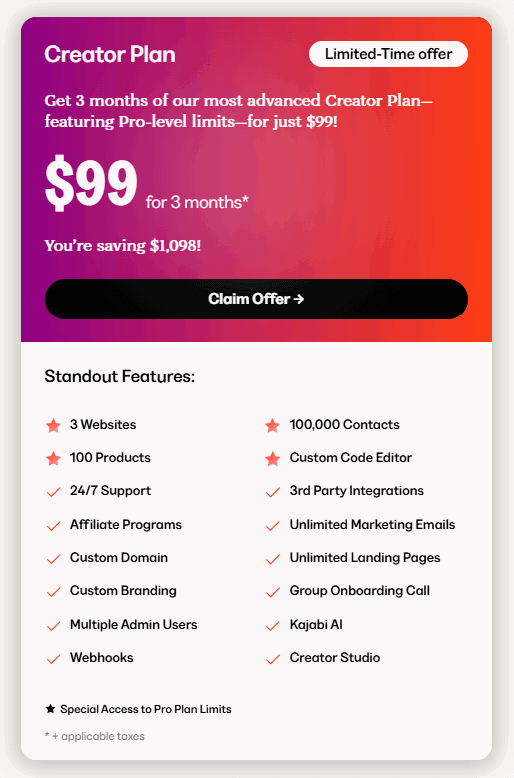
Usually, Kajabi offers four pricing plans. But at the time of writing this blog, they’re offering only one special premium plan for creators.
1. The Creator Plan: $99 (for 3 months)
The usual pricing plans that you’ll get after the three months are:
1. Kickstart: $71/month (billed annually)
2. Basic: $119/month (billed annually)
3. Growth: $159/month (billed annually)
4. Pro: $319/month (billed annually)
9. Bettermode
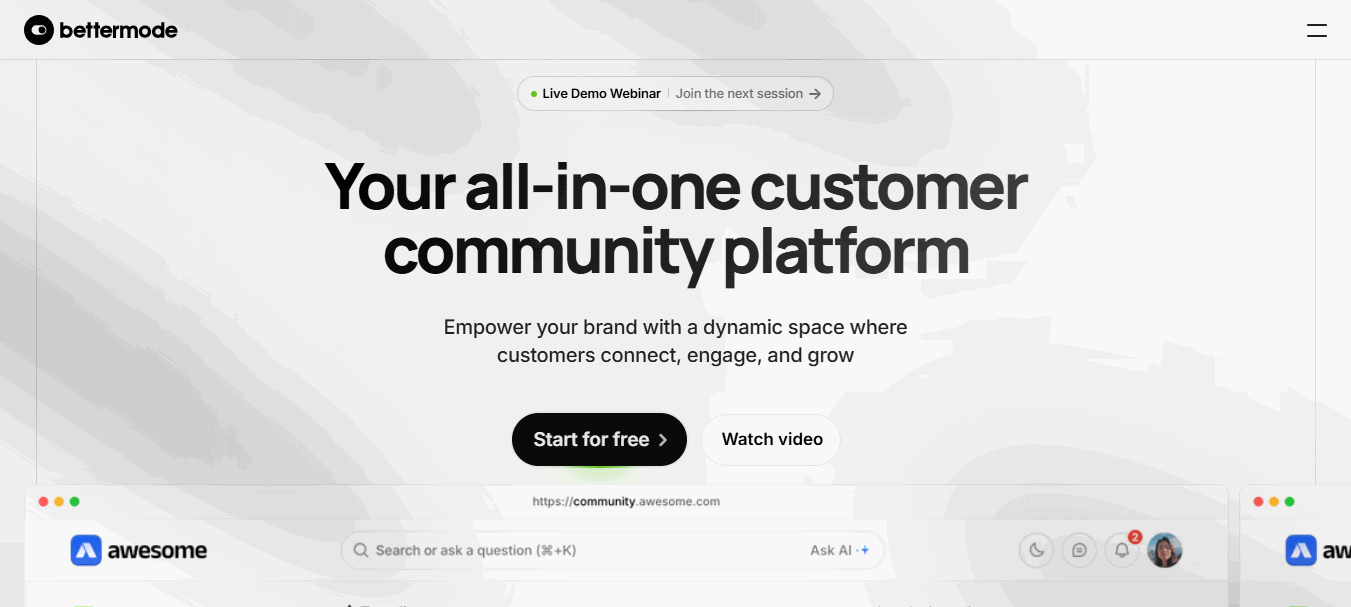
Bettermode is a self-managed community-building platform that allows companies to create their own branded online communities. Streamlining customer experiences while promoting engagement and collaboration, Bettermode removes the hassle and requirement of relying on several tools commonly used by customers.
This flexible space is perfect for discussions, content sharing, and interactions among members. It can be used as a tool to connect with your customers better and build stronger relationships with them.
Key Features
Moderation & Post Management: Bettermode provides you with tools to manage your posts, set rules, and keep things respectful.
Permissions & Private Spaces: You can control access and create exclusive, restricted areas for your community.
Collaboration: Bettermode lets you share files, message in groups, and organize conversations with ease.
Integration & Workflow Sync: You can connect Bettermode with CRMs and other business tools to streamline processes.
Analytics & Reporting: Bettermode gives you real-time insights into community performance and engagement.
Pros
Clean and user-friendly UI.
Business-friendly features included.
Strong tools for content moderation.
Detailed analytics and white-labeling options.
Cons
High cost for individual users.
Unsuitable for smaller businesses.
Limited user account availability.
No monetization or landing pages.
Pricing
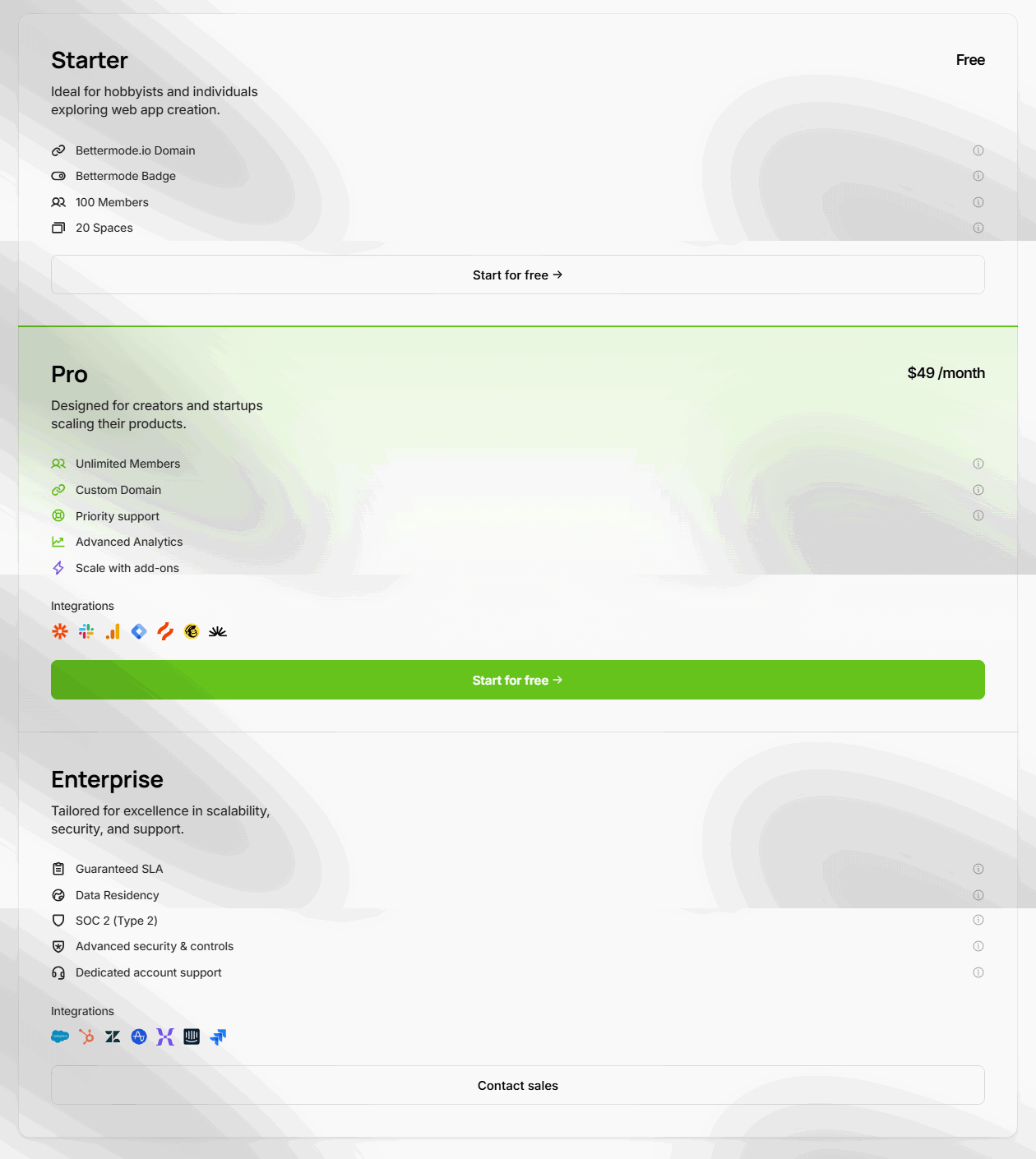
Bettermode offers three pricing plans.
1. Starter: Free
2. Pro: $49/month (billed annually)
3. Enterprise: Contact sales
10. Disciple
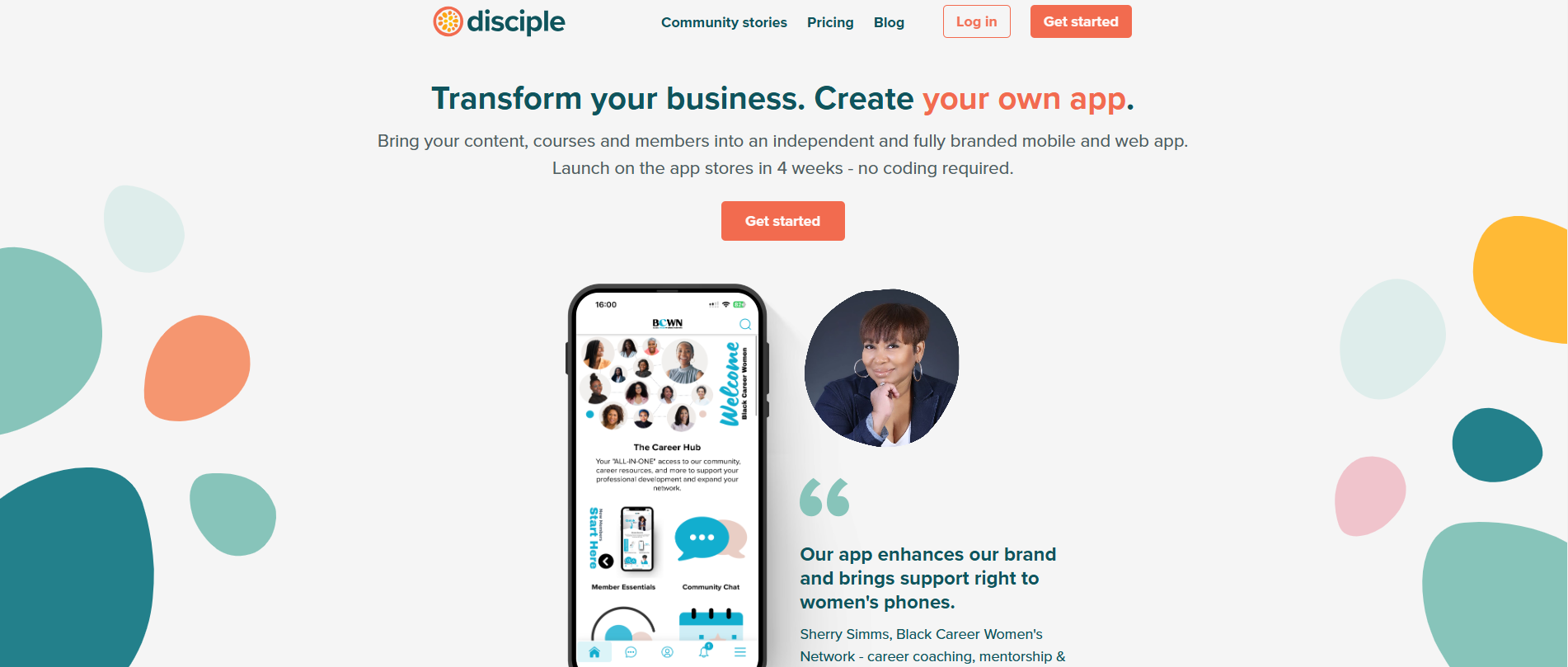
Disciple is a community platform that enables creators to design their fully-branded community applications.
Disciple hones in on one specific area: it provides a private space for people to discuss, share content, and interact with members. That makes Disciple very flexible but also customizable, perfect for creators wanting to offer a different immersive community experience.
The platform allows you to make separate groups and categorize your audience, share video content, and reach your members via live streams, broadcasts, direct messaging, etc. It is also possible to monetize your online courses or subscriptions through this platform.
Key Features
Community Management: You can control what’s shared, moderate content, define community standards, and set clear guidelines.
Customization: Disciple lets you design a community space that matches your brand's style.
Engagement: Disciple offers tools like polls, events, and notifications to boost user interaction and participation.
Monetization: You have the option to charge for content, offer memberships, or sell exclusive access.
Pros
Well-organized and easy-to-navigate interface.
Excellent and responsive support team.
Strong reporting and analytics tools for providing greater control and insight into the community.
Native mobile app on higher plans (for Android, iOS, and web).
Cons
Very high pricing for access.
Limited to yearly or 6-month plans.
Extra charges for course features.
Mobile app lacks full web features.
Pricing
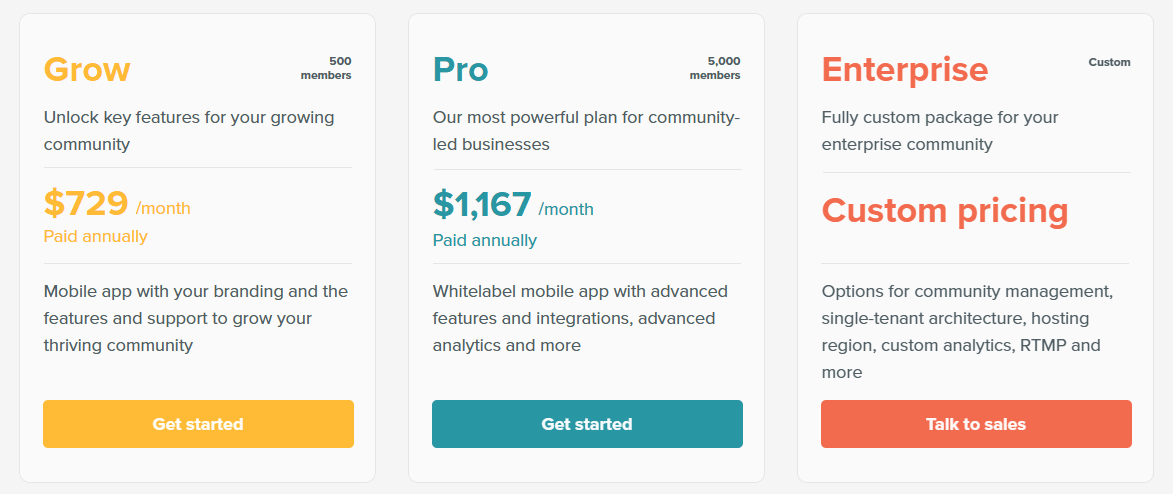
Disciple offers three pricing plans.
1. Grow: $729/month (billed annually)
2. Pro: $1,167/month (billed annually)
3. Enterprise: Custom pricing
How to Choose the Best Platform to Build Online Community
Choosing the right platform can make or break your community. You need a platform that aligns with your goals, audience, and content style.
Start by defining your purpose. Is it for creators? Course builders? Product support? Different goals need different platforms.
For example, a coaching community might thrive on EzyCourse, while a forum-based space could work better on Discourse.
Next, think about your audience. Choose a platform that you think offers the most user-friendly experience.
Here’s a quick checklist to help your pick the best platform to build online community:
Factor | What to Consider |
Ease of Use | Can you set it up without taking help from a professional? |
Customization | Can you match it with your brand? |
Engagement Tools | Are there posts, chats, events, and gamification? |
Monetization Options | Can you sell memberships or courses easily? |
Scalability | Will it grow with your audience? |
Integrations | Does it work with tools you already use? |
Pricing | Is it budget-friendly? |
Finally, don’t forget about long-term ownership. Some platforms control your audience and data. Look for ones that give you full control, especially if you're building a business around your community.

Why EzyCourse is the Best Platform to Build Online Community?
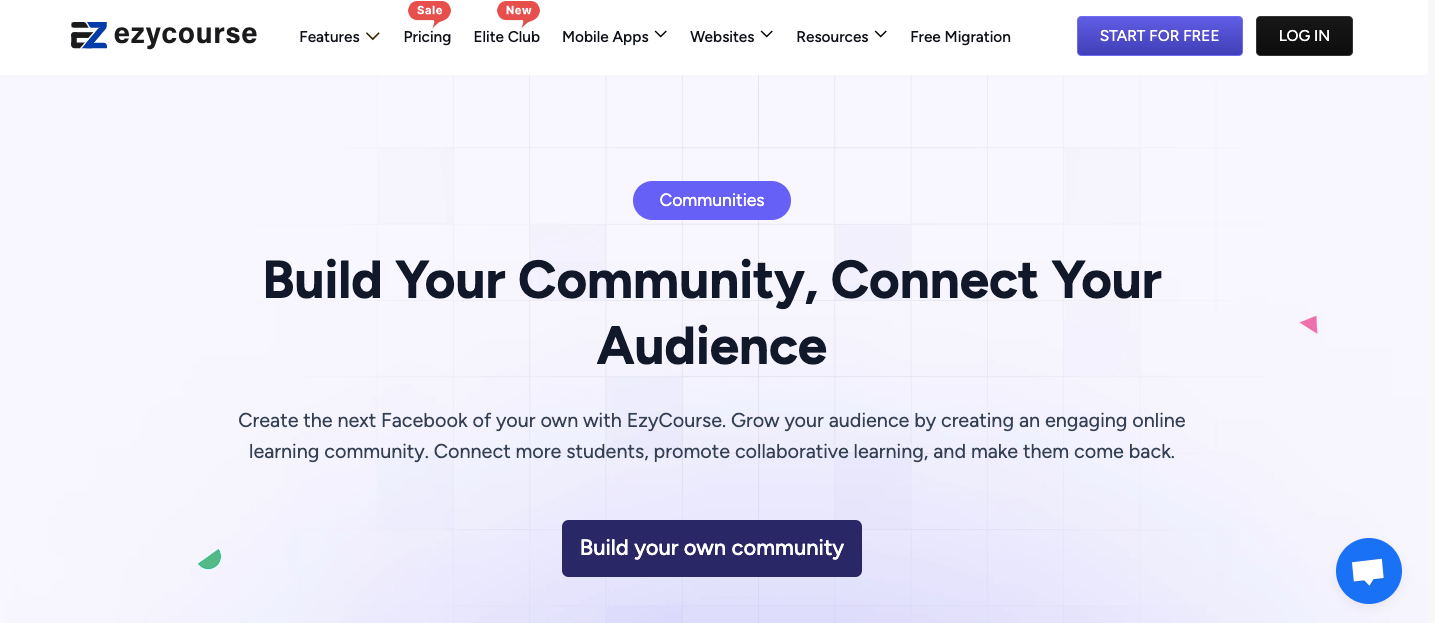
EzyCourse gives you everything you need to build and grow a strong online community. It combines tools for engagement, interaction, and monetization in one place.
You can create Facebook-style community spaces, interactive forums, and private chats to keep members connected and active. It also lets you build membership sites, sell courses, and unlock multiple revenue streams.
EzyCourse replaces the need for separate platforms by offering course creation, community features, membership options, and email marketing in one place. You can get a dedicated community space with features like an interactive feed, private channels, comments, live chat, and push notifications.
This platform also supports full customization, including white-labeling and branded mobile apps for seamless access.
Creators can monetize their communities in several ways, whether through memberships, digital products, or paid content.
The platform also stands out with reliable, responsive customer support to help you along the way. With its all-in-one approach and powerful features, EzyCourse makes it easy to build, manage, and grow vibrant online communities.

Build a Community Today and Start Growing Your Audience
Building a thriving community involves more than simply leveraging community-building software. The best platform to build an online community determines your community's vibe and appearance, effectiveness, and overall experience for the users.
Thus, it impacts your content creation, reception of that content, and interactions among members.
Ensure that the platform you choose is in accordance with your brand, suitable for the features you require, and scalable as your community expands.
If you want to build an online community with minimal effort, try EzyCourse now and use its easy community-building tools to set up your community.

FAQs
What is an online community platform?
An online community platform is a digital space where people gather to interact, share knowledge, and build relationships around shared interests. It functions like a virtual version of a real-world community, enabling discussions, content sharing, and collaboration.
What are the best online community platforms for businesses?
Some of the most effective platforms for building business communities include EzyCourse, Thinkific, Circle, Mighty Networks, Facebook Groups, and Kajabi. Each offers unique features tailored for creators, educators, and brands aiming to grow and engage their audiences.
How can I choose the right community platform online?
Choosing the right platform depends on your goals, budget, technical ability, and the size of your community. Evaluate which features matter most to your business, such as course creation, monetization, mobile access, or engagement tools.
How can I start an online community for free?
You can launch a community for free using platforms like Facebook Groups, Discord, Patreon, or the free trial of EzyCourse. These options allow you to build and grow a community with minimal upfront costs.
How do I grow and develop my online community?
Strive to establish value around frequent content production, consistent audience engagement, and a mission-aligned to their needs. Facilitate engagement, make changes based on concrete feedback, and perpetually enhance the experience for your members.
